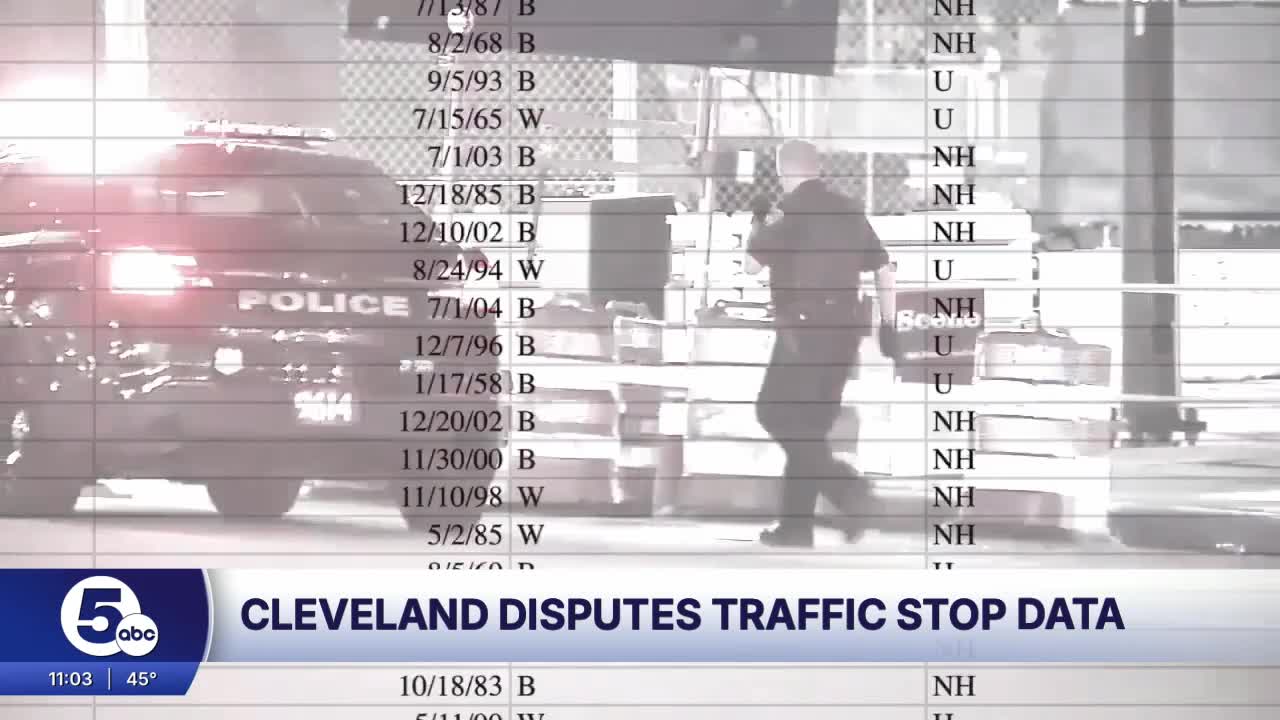CLEVELAND — Cleveland police searched Black people more than three times as often as white people during stops in 2023 — despite finding contraband at similar rates, a Marshall Project - Cleveland and WEWS News 5 analysis found in 2024.
RELATED: Cleveland police stop and search Black drivers at higher rates despite DOJ oversight
And now, a year later, an independent data analytics law firm said new data shows there is "no evidence of bias."
The City of Cleveland announced a new partnership with Sigma Squared, a data analytics company, to evaluate datasets aimed at uncovering whether racial disparities exist within the Cleveland Division of Police (CDP).
The City asked Sigma Squared to specifically examine investigatory and traffic stops and searches from 2024, given that it’s the most recent full year of data available.
Sigma Squared's team is led by Dr. Roland Fryer, a Professor of Economics at Harvard University.
News 5 Investigator Sarah Buduson asked Dr. Fryer Thursday afternoon what specifically led him to say there is no evidence of bias in traffic stops.
"A comparison of the population of the fraction of the stops versus how actually productive are those stops," he told her.
That comparison is called a hit rate test, which even Dr. Fryer said has been criticized "rightfully."
The test has been criticized in the past because it doesn't look at racial profiling or pretextual stops, according to the Stanford Computational Policy Lab.
Dr. Fryer said a threshold test was also conducted.
"Is there statistical evidence that you are using the same threshold to stop minority drivers that you are non-minority drivers? We did both of those tests for all of 2024. And what we found in 2024 was that yes, there is a larger fraction of minorities stopped in Cleveland than non-minorities, but when it comes to the actual efficiency of those stops, they're statistically the same. That tells us no bias," he said.
Cleveland was supposed to be collecting data years ago, but didn't until 2022, when it was required under the city's federal consent decree.
RELATED: Monitors: Cleveland earns 20 upgrades in consent decree report, but 'significant work remains'
Reforms were agreed to in 2014 when a U.S. Department of Justice investigation found that the Cleveland Police violated people's civil rights.
In 2024, News 5 Investigators pored through 17,000 traffic stops from the year prior, finding that 63% of those drivers were Black, whereas only 32% were white.
News 5 Investigators also found Black people were searched more than three times as often as white people.
But similar amounts of contraband, like drugs and weapons, were found.
"We create micro grids. We have hot spot heat maps that we send our men and women out there [to] and we're saying, you know, this is where the crimes are occurring," Cleveland Police Chief Dorothy A. Todd said. "It's not about race, gender. When we see those crimes, it's about the heat maps that are developed that show this is where crime is occurring in the neighborhoods and this is where we need to send our resources."
While News 5's reporting focuses on 2023 data, Cleveland Mayor Justin Bibb previously told us an independent firm had not yet reviewed it, and Sigma Squared appears not to have reviewed it either.
"How could the police department possibly change in a way that would be productive when the data they're looking at is two years old?," Dr. Fryer said.
It's data from Columbia University law professor, Jeffrey Fagan, who also researches racial disparities in policing, deemed problematic.
"When I looked at the data in Cleveland… They are indirectly profiling Black drivers," Fagan told News 5 Investigators in 2024.
Moving forward, software is being built that would provide real-time data and more specifics that weren't highlighted during Thursday's press conference.
"The city of Cleveland stands firm in its commitment to fair, impartial, and constitutional policing. Every resident deserves confidence that police decisions are guided by behavior and evidence, not race, gender, or background," Executive Director for Cleveland's Police Accountability Team, Leigh Anderson said.
The data has yet to be made public, but the city says it's in the works.
The raw data we announced to the community last year was just that – a preliminary baseline that lacked the critical context to draw any sort of definitive conclusions, which is why I urged caution in rushing to judgment and committed to having outside experts look further into the data. This new partnership with Sigma Squared fulfills that promise and their analysis provides us with the needed context that ultimately revealed no evidence of systemic racial bias. This level of objectivity, by opening up our books to be rigorously reviewed by an outside firm, is the key to improving transparency and building trust with the community. If future analyses indicate we need to make changes – whether that’s just one neighborhood or district, or across the entire Division – the community can rest assured that we will take corrective action to address those issues head-on.
“This certainly isn’t a mission accomplished moment, but these initial results are a great step in the right direction,” added Mayor Bibb.
The city’s partnership with Sigma Squared will continue beyond this analysis.




